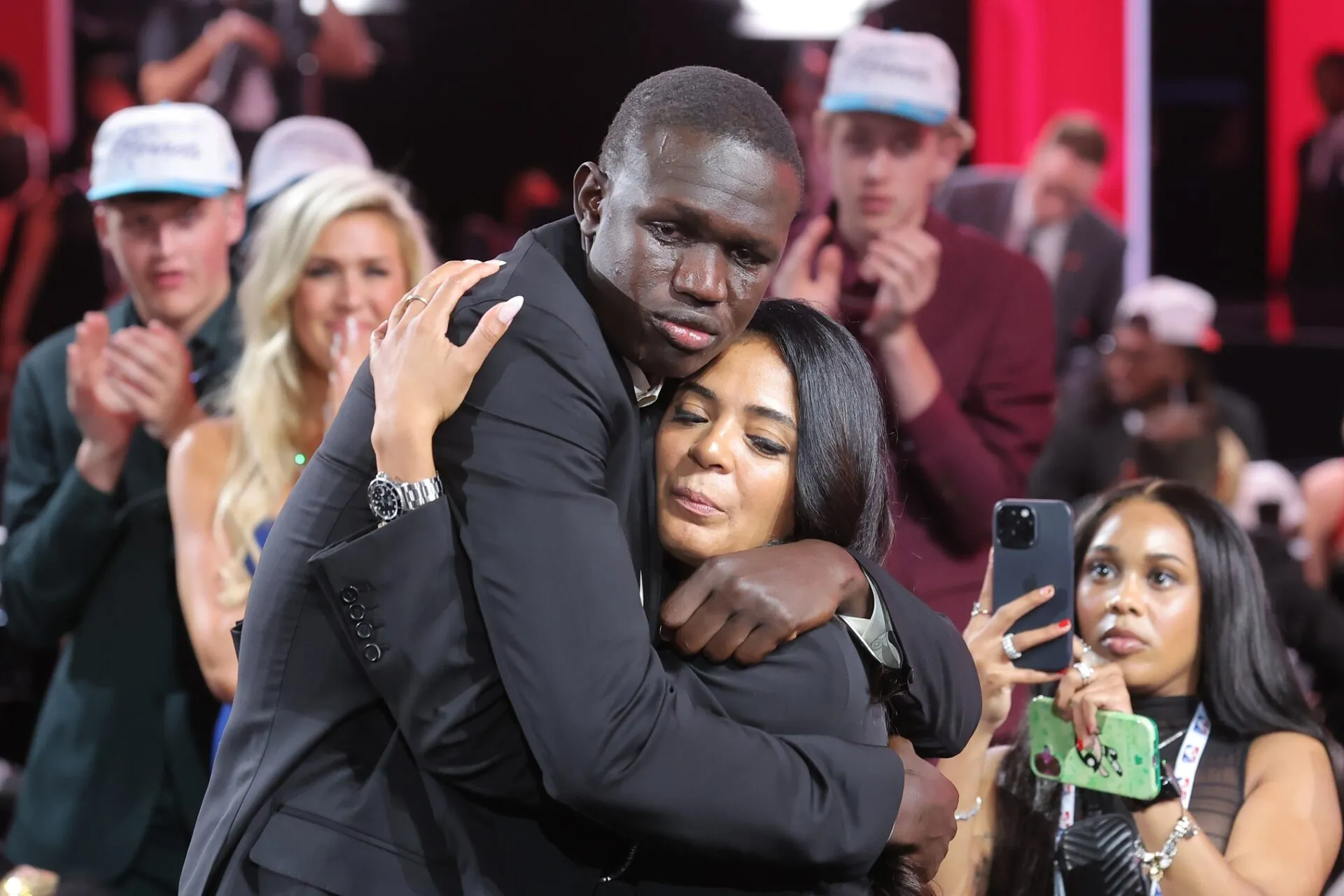On a dusty street in Kampala, Uganda, nearly a decade ago, a tall, shy teenager ambled along with no clue that a casual encounter would change the trajectory of his life. He was just a boy then—Khaman Maluach, a South Sudanese refugee displaced by conflict, unsure of what future awaited him. His towering height already turned heads, but what happened that day would start him on a journey that would eventually land him on one of basketball’s biggest stages. Fast forward to the 2025 NBA Draft, and the same boy who once fled war-torn South Sudan is now a top-10 pick, cementing his place among the game’s elite and emerging as one of the most compelling stories in modern sports.
The journey of Khaman Maluach is nothing short of cinematic. Born in 2006 in South Sudan, Maluach’s early childhood was marred by instability, violence, and the constant struggle for survival. His family, like so many others, sought refuge from the country’s brutal civil war, eventually settling in Uganda. Life in a refugee camp offered little promise and even less comfort, but it was there that Khaman’s stature began to outpace his peers—and ultimately, his environment.
Basketball wasn’t on his radar. He’d never touched a ball, never seen a court, and never envisioned himself as an athlete. He was more interested in football (soccer), which was everywhere in Uganda, and served as an escape for many boys like him. But fate intervened one day in the form of a man affiliated with a local basketball development program. Spotting Khaman on the street, the man approached him, initially just to ask his height. He was skeptical when Khaman said he was 6-foot-8 at just 13 years old, so he asked the boy to stand next to a pole to estimate it. His instincts were right—this was no ordinary kid.
What followed was a gentle nudge into basketball’s orbit. That nudge turned into a full leap when Khaman was introduced to the NBA Academy Africa in Senegal, a program created to scout and develop Africa’s top young basketball talents. The academy offered not only structured athletic training but also education and support systems—something that had been scarce in his life until then. At the academy, coaches quickly realized what they had: a rare, raw, towering prospect with an enormous wingspan, quick feet, high intelligence, and an insatiable work ethic.
The boy who had never played basketball until his early teens was now being fast-tracked through the sport’s elite developmental system. His progression was meteoric. Within just a few years, Maluach was suiting up for the South Sudanese national team, becoming one of the youngest players ever to compete in a FIBA World Cup at just 16. He didn’t just make the team—he made an impact, defending older, stronger players with poise and anchoring his side with a presence far beyond his years.
Scouts began to whisper. Then they began to shout. By the time he was 17, he had played in international showcases, was drawing comparisons to Rudy Gobert and a young Serge Ibaka, and was being courted by the top basketball programs and agents across the world. Offers poured in, but Khaman remained focused on the fundamentals, understanding that his road had already been vastly different from that of his peers. He trained tirelessly, adapted to new systems with impressive fluidity, and—perhaps most importantly—never forgot where he came from.
When the 2025 NBA Draft arrived, there was a quiet sense of anticipation surrounding Maluach. He was projected to go in the top 10, though some still labeled him a “project” due to his limited years of experience. But those who had watched him up close—scouts, coaches, teammates—knew otherwise. They saw his ability to switch onto guards, block shots out of nowhere, crash the glass with ferocity, and knock down mid-range jumpers with growing confidence. They saw his leadership qualities, how he encouraged his teammates, how he learned voraciously from veterans. They saw something else too—intangible and irreplaceable—a hunger born not of ambition, but of survival.
And so, with the 9th overall pick in the 2025 NBA Draft, a team that believed in both his present and future called his name: Khaman Maluach. The crowd erupted, the television cameras zoomed in on his beaming face, and an entire continent quietly rejoiced. For Africa, and especially for South Sudan, his selection was not just about basketball—it was about representation, possibility, and the reminder that even the most unimaginable dreams can be realized.
In his post-draft interview, Maluach’s voice cracked with emotion as he reflected on the long road he had taken to that stage. He thanked his mother, who had sacrificed everything to ensure her children could have a future. He thanked the NBA Academy Africa for giving him the tools to grow, and he thanked his country—both his native South Sudan and adopted Uganda—for shaping his resilience.
“I just want kids who are in camps right now—who feel invisible, who feel hopeless—to know that someone like them made it,” he said, tears forming. “If I can be here, so can they.”
Already, his impact is being felt beyond the court. Social media in Africa exploded with praise and pride, while basketball clinics across Uganda and South Sudan saw spikes in participation from young boys and girls who now see a bit of themselves in the lanky teenager who dared to dream. African basketball legends like Luol Deng—who himself fled Sudan and played in the NBA—were effusive in their support, calling Maluach’s story “the next chapter in Africa’s basketball revolution.”
What makes Maluach’s rise even more remarkable is the humility with which he carries it. Coaches say he’s the first in the gym and the last to leave. Teammates speak of his kindness and his habit of checking on rookies and role players who feel overwhelmed. He doesn’t view himself as a star. He views himself as someone who owes the game—and life—a debt of gratitude.
Of course, the NBA will challenge him. At 7-foot-2, the physical demands of the game will test his durability. Offensive refinement will take time. But no one questions his defensive upside, his ability to run the floor, and the sheer ceiling of potential he brings. He is not just a rim protector; he is a symbol of a new generation of global stars who don’t follow the traditional pipeline of AAU tournaments and prep schools. He’s proof that talent can come from anywhere—even from a refugee camp on the edge of Kampala.
His presence in the NBA will do more than win games; it will inspire investment in grassroots programs across Africa, encourage the expansion of NBA-supported academies, and hopefully bring more attention to the plights and potentials of displaced youth worldwide. In a time when the sports world is increasingly global, Khaman Maluach stands as a bridge between hardship and hope.
Back in Uganda, the street where he was first discovered remains much the same—dusty, bustling, unremarkable to the outside world. But to those who know his story, it’s become hallowed ground, the unlikely starting point for a journey that has captivated millions.
From refugee to rising star, from the shadows of war to the spotlight of the NBA, Khaman Maluach’s story isn’t just about basketball. It’s about resilience. It’s about the life-altering power of opportunity. And most of all, it’s about what can happen when one person dares to dream, even when the world tells them not to.
The world now knows his name. And for every child living in the margins, Khaman Maluach is more than an athlete—he’s a promise.



